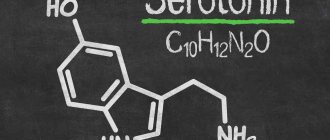Detection of melatonin
In 1958, the team of Aaron Lerner, a professor of dermatology from Yale University in the USA, managed to isolate a new compound from the epiphyses of cows, which, when introduced into the skin of a tadpole, lightened it.
The substance blocked the production of melanocyte-stimulating hormone, which is why it was called “melatonin”. Later they discovered that the open compound is synthesized in the body mainly at night. This was associated with daily periods of rest and wakefulness, and for two decades melatonin was considered only a sleep hormone that regulates human circadian rhythms.
Cellular Clock - Nobel Prize 2021
Chronobiology, the science that studies biological rhythms, distinguishes diurnal, tidal, weekly, seasonal and annual rhythms. In this article we will touch upon issues related to circadian (from Latin circa - “around, around” + dies - “day”) rhythms. Circadian rhythms arose as a result of daily changes in light caused by the Earth's rotation. Cyanobacteria, fungi, plants and animals have circadian rhythms. In humans, daily changes in physiological parameters can be observed: body temperature, synthesis of hormones (for example, cortisol) and enzymes, sleep-wake cycles [1], [2].
By the mid-twentieth century, much data had already been accumulated on circadian rhythms, and therefore the theme of the annual symposium on quantitative biology at Cold Spring Harbor in 1960 was “Biological Clocks.” The following decades saw major developments in the study of the molecular basis of circadian rhythms, for which Geoffrey Hall, Michael Rosbash and Michael Young were awarded the Nobel Prize in Physiology or Medicine in 2017 [3].
Using a fruit fly model, scientists have shown that there are genes, that is, physical carriers of information, that influence not just a trait (such as the color of human eyes or the color of bean flowers), but the behavior of the whole organism - when to go to bed; how many seconds to sing the marriage song. They isolated these genes (per, tim, dbt) and learned to make changes to them, thereby influencing behavior. They were able to unravel the full cycle of reactions that occur around the nucleus and allow the cell to maintain its own internal clock through the autoregulation of the protein machine.
Thus, it is now known that the body’s circadian rhythms are supported by the work of the internal cellular clock. What about environmental factors?
Melatonin production
80% of melatonin is produced by the pineal gland, a 100-125 mg pineal gland located in the brain. The remaining 20% of melatonin is produced by special cells:
- digestive tract;
- bronchi and lungs;
- kidney;
- pancreas;
- prostate and ovaries;
- retina, other organs and tissues.
Melatonin is produced even by blood cells: eosinophils and lymphocytes.
This discovery was made in 1974 by Soviet scientists Nathan Tanfelevich Raikhlin and Igor Moiseevich Kvetnoy. This “peripheral” melatonin does not affect circadian rhythms, working exclusively at the local level.
Action of melatonin
The “sleep hormone”
begins to be produced between 20 and 22 hours (earlier for early risers, later for night owls). The concentration of melatonin peaks from midnight to two o'clock in the morning, and by six to seven o'clock in the morning it drops to its minimum level.
How does melatonin work?
- Absorbs free radicals - unstable molecules that damage organs and tissues, lead to decreased immunity, the development of tumors and cardiovascular diseases.
- It is the strongest natural immunomodulator, restores damaged cells, prevents diseases, including cancer.
- It has a pronounced chronobiotic effect: it regulates daily and seasonal biorhythms.
- Promotes sleep, is responsible for calm restorative sleep, bringing natural rest.
- Regulates the functioning of the endocrine system, normalizes body temperature.
- Acts as an antidepressant and prevents the occurrence of certain mental disorders.
- Slows down the rate of aging, increases life expectancy.
What lowers melatonin levels?
- Age. After 45-50 years, the production of natural melatonin decreases.
- Light. The pineal gland can only produce melatonin in the dark. If the lights are turned on at night, the production of the hormone slows down until it stops completely. The glow of the screens of a mobile phone, tablet, laptop, computer or TV reduces the synthesis of melatonin.
- Smoking.
- Drinking alcoholic or caffeinated drinks.
- Taking nonsteroidal anti-inflammatory drugs (NSAIDs), vitamin B12, and some other medications.
What increases melatonin production?
- Lack of light at bedtime
- Calcium
- Magnesium
- Vitamin B6
- A nicotinic acid.
The use of synthetic melatonin analogues in medicine
Most often, melatonin preparations are used to treat various sleep disorders.
Conducted studies prove the effectiveness of melatonin for acute insomnia: the time to fall asleep decreases, the quality of night sleep and its duration improve. Taking melatonin is justified in case of chronobiological disorders, when a person often changes time zones or works on a shift schedule alternating night and day shifts.
“Sleep hormone” drugs cannot be used as a usual sleeping pill. They help only with failures caused by a decrease in melatonin production. In other cases there will be no effect.
Melatonin is not prescribed for:
- chronic insomnia;
- maintaining the daily secretion of your own melatonin;
- normal biological rhythms.
Dietary supplement or medicine?
There is still no consensus among doctors whether to consider melatonin a medicine or a biologically active supplement (dietary supplement).
IN THE USA
The Food and Drug Administration (FDA) has not approved it for medical use, so melatonin is sold over-the-counter as a dietary supplement.
In the European Union and Australia,
melatonin is considered a medicine, sold by prescription and used to treat insomnia in children, adolescents and people over 55 years of age.
In Russia
Dosage forms of the drug and dietary supplements have been registered and can be purchased in pharmacies and sports nutrition stores without a prescription.
Melatonin is used as an adjuvant therapy for:
- peptic ulcer of the stomach and duodenum;
- hypertension;
- Alzheimer's disease and other memory disorders;
- depression and other diseases.
Research into the pharmacological activity and effectiveness of melatonin is ongoing. To date, more than 26 thousand scientific papers have been published, each of which opens up new pages in the use of this amazing substance.
When should you contact Altimed MC?
You should seek help from the Altimed Medical Center if obvious signs of melatonin deficiency appear:
- Sleep problems - if you suffer from insomnia, wake up easily in the middle of the night or have trouble falling asleep, if you don't dream often during sleep, have shallow or restless sleep and anxious thinking at night - these are the main signs of low melatonin, although cortisol levels are also may be to blame. In fact, cortisol and melatonin levels have an inverse relationship with each other in the body.
- Mood changes . If you lack inner peace, are always anxious, suffer from seasonal affective disorder or depression, or are always on edge and always irritable, you may have low melatonin levels. Melatonin is converted to serotonin, a neurotransmitter whose levels increase with some antidepressants.
- Menopause symptoms - hot flashes, increased heart rate, morning depression and irregular cycles - are believed to improve with melatonin supplements.
- Symptoms of Low Thyroid Hormone Levels . Melatonin helps convert thyroxine (T4) into active triiodothyronine (T3), which gives you energy and generates heat. In fact, melatonin and thyroid-stimulating hormone come from the pineal gland. Thus, symptoms of hypothyroidism may indicate low melatonin levels.
- Intestinal symptoms such as pain, hyperactivity and intestinal cramps may also indicate low melatonin levels.
Melatonin and COVID-19
The COVID-19 pandemic, caused by the SARS-CoV-2 virus, has forced scientists to actively study the effect of melatonin on the course of this disease. As a result, the usual “sleep regulator” began to be used in a complex of means of auxiliary therapy for COVID-19. In the fall of 2020, it was even used to treat US President Donald Trump. US
Melatonin Reviews In October 2021, the electronic scientific library medRxiv published a report on a research work in which 800 cases of severe COVID-19 were studied. It turned out that patients who initially had high levels of their own melatonin, and those who received the hormone in the form of a drug, were significantly more likely to survive in intensive care. Melatonin increased the chances of recovery, both from coronavirus and any other infection that affects the lungs.
Canada and Argentina.
The work was published in the journal Diseases in November 2021. A joint study from the University of Toronto and the Pontifical Catholic University found that the disease may be more severe in older people due to decreased levels of melatonin. Melatonin in adequate doses prevents the development of an aggressive form of COVID-19, and also supports the effect of the anti-coronavirus vaccine.
Brazil.
Data published by Melatonin Research in early 2021. Scientists from the University of Sao Paulo have proven that melatonin, which is produced by the cells of the alveoli of the lungs, becomes a barrier to coronavirus. This may be why people with high levels of melatonin do not become infected with Covid or experience the disease easily. Regina Pekelman, the author of the study, is confident that using nasal drops or a spray with melatonin is an effective means of combating COVID-19.
To enter the human body, SARS-CoV-2 viruses must bind to angiotensin-converting enzyme 2 (ACE2) receptors located on the surface of lung cells. Only by combining with ACE2 do coronaviruses enter the cell and begin to multiply, leading to disease.
Melatonin reduces the number of free ACE2 receptors, as a result, the number of connections between the virus and the enzyme is reduced, which leads to damage to a minimum number of cells, which means the coronavirus infection will occur in a mild form.
Additionally, melatonin reduces the inflammatory response at the site of virus entry and controls the immune response, preventing the development of a “cytokine storm.” And since it is the violent cytokine reaction that leads to a fatal result, its suppression increases the patient’s chances of surviving and avoiding serious complications.
In our country
sufficient scientific experience has not yet been accumulated to confirm the fact that melatonin prevents severe COVID-19, and the mechanism of action of melatonin on the human body has not yet been sufficiently studied. However, empirical evidence provides encouraging results and supports the positive effect of melatonin on the outcome of COVID-19.
Melatonin preparations are available in Russia without a prescription, but you should not take them without an in-person consultation with a doctor, either to correct sleep disorders or to prevent or treat COVID-19.
Contraindications
The drug is not recommended to be taken:
- in childhood. Children, as a rule, do not need melatonin - they produce a sufficient amount of their own;
- women who are planning pregnancy. There is evidence that taking the hormone sometimes disrupts the ovulation process;
- people who drive vehicles or perform work that requires high concentration. Melatonin makes a person sleepy and reduces the reaction rate, so engaging in the above activities while taking the drug is life-threatening;
- patients who suffer from bleeding. The hormone reduces blood clotting, so stopping bleeding, for example, with a stomach ulcer, will be much more difficult;
- diabetics who use medications to normalize blood sugar levels;
- allergy sufferers, people with autoimmune diseases. The substance stimulates the activity of the immune system, therefore increasing the likelihood of exacerbation of allergic reactions or symptoms of the disease;
- during pregnancy and lactation. Doctors do not know exactly how taking the hormone affects the development of the child, so they do not advise mothers to take risks.
Possible side effects are lethargy, drowsiness, especially in the morning, headache, diarrhea, allergic reactions, decreased visual acuity, dizziness. But an overdose of the drug does not cause long-term harm. Disorientation and prolonged sleep may occur.
Drowsiness and lethargy may occur when taking melatonin
In the US, melatonin is considered a dietary supplement. In Russia, this hormone is included in the drugs Melatonin, Melaxen, Melaton, Circadin, Yukalin, Melapur. The drug Vita-Melatonin is produced in Ukraine.
Publications on the topic of the month “How to overcome post-Covid syndrome”
- Lung recovery after coronavirus
- Restoring the sense of smell after coronavirus
- Restoring memory after suffering from coronavirus
- Overcoming mental disorders during post-Covid syndrome
- We are experiencing COVID. How the coronavirus pandemic affects mental functioning
- Post-Covid screening - examination after a new coronavirus infection
- How to return digestion to normal after coronavirus?
- Loss of smell due to COVID-19 - advice from an otolaryngologist
- Recommendations from a cardiologist after suffering from COVID-19
- Coronavirus turned out to be “vindictive” - what is important to know
- Post-Covid syndrome: program for diagnosis and regression of post-Covid symptoms. How to Manage Long-Term Long COVID Symptoms
References
- Poluektov, M.G., Buzunov, R.V., Verbitsky, E.V. and others. Draft clinical guidelines for the diagnosis and treatment of chronic insomnia in adults, Consilium Medicum. Neurology and Rheumatology, 2016. - V. 2. - pp. 41–51.
- Bhattacharya, S., Patel, K., Dehari, D. et al. Melatonin and its ubiquitous anticancer effects. Mol Cell Biochem., 2021. - Vol. 462(1-2). — P. 133-155.
- Cipolla-Neto, J., do Amaral, F. Melatonin as a Hormone: New Physiological and Clinical Insights, Endocrine Reviews, 2021. - Vol. 39(6). — P. 990-1028.








